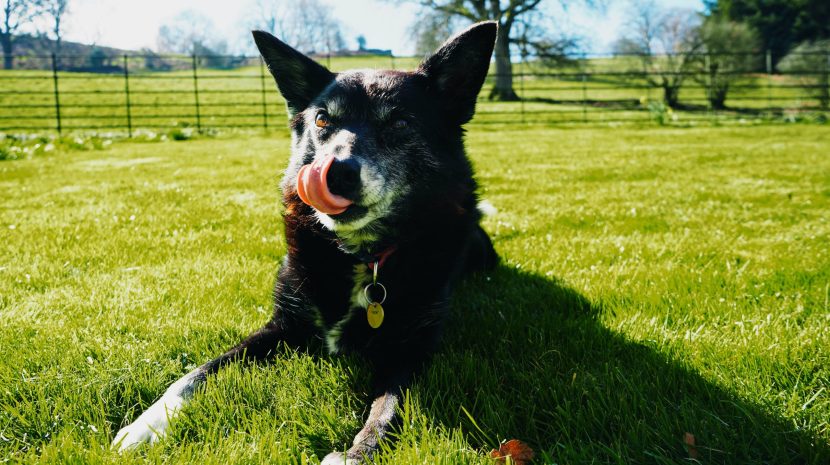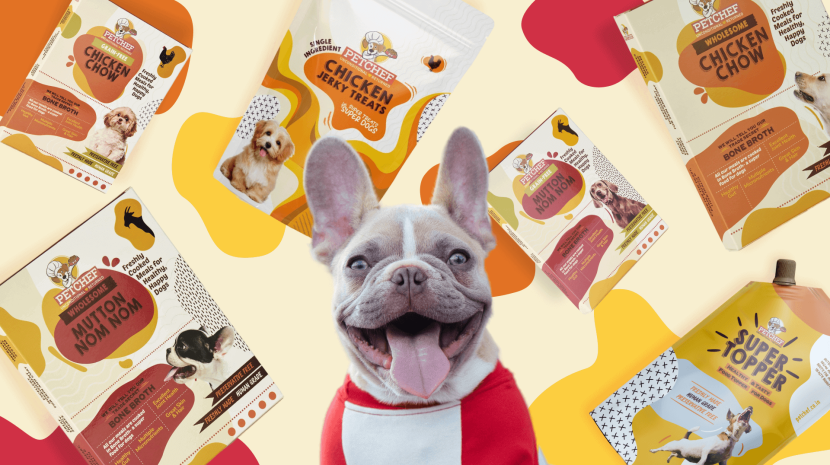Hey! Wasn’t it only yesterday that you were enjoying your pup’s carefree gambolling, and then found yourself chasing and being chased by it? And what is it you noticed today? Grey hairs where you were used to cuddling the golden? An extra paunch on your beloved whom you thought was in its best shape? And a looong snoot whose lethargic droop put into your mind that dreadful sentence: my doggy is getting on in age!
We get it: you hate to see your baby not only all grown up but also grown old, all in a twinkling! So now your furry friend is to be called a senior dog.
The term senior dog is used to refer to dogs above seven years of age. In human terms, this translates to a range of 44 to 56 years. Surely, this is hardly what we would call old, but that is because canines have a very short lifespan of 12-20 years.
The onset of old age in dogs begins when they have reached their half life expectancy and varies according to their breed and size: smaller breeds (Dachshund, Beagles, etc) live longer, so the criterion for being considered senior with smaller dogs extends upto to 10 years. Whereas the bigger breeds (Great Danes, Saint Bernard, etc) can become old as early as 6-7 years owing to their shorter life expectancy.
Inevitably, ageing brings with it a host of changes that may, at first, seem overwhelming to you as pet parents. But the way ahead is by positively engaging with those changes that seem to come over your pup all of a sudden (whereas they were in the making over a long period of time)!
Here are some of the initial signs that signal your pet’s passage into seniority:
- blurred vision and/or decreased hearing
- bad breath
- unexplained weight loss/gain
- uncontrolled drooling
- general lethargy
- poor appetite and/or fussy eating behaviour
- lumpy or dry skin
- constipation and/or flatulence
- poor dental health (including weak taste buds)
- impaired or restricted mobility
These and other symptoms can worsen further and which helps to distinguish the term senior dogs from geriatric dogs. When you hear vets referring to the latter, they mean dogs who have reached the farthest end of their senior period. Some symptoms of geriatric (very old) dogs include:
- memory loss
- increased urination (due to underlying kidney disease) or urinary incontinence
- disturbed or non-existent sleeping patterns
- severe osteoarthritis making unassisted walking impossible for your dog
These are terrible conditions for your fur baby to experience now or in the near future. Heartbreaking, to say the least, as we are all helpless in the face of age.
But what is certainly in our hands is controlling the damage advancement in age causes. One way of doing this is to respond to their bodily changes by bringing about respective changes in their diet.
Here are some preliminary points you will want to keep in mind while preparing your senior dog’s new diet:
- senior dogs require 50% more protein as compared to younger dogs for maintaining a lean muscle mass and to compensate for low energy reserves
- due to decreased physical activity, a low carb and calories diet is a must
- diet high in fiber is recommended to help the gut perform better digestion
- in order to lessen dental damage, soft textured and wet foods should be included
- foods high in water content to combat the dehydration natural to advanced age (unless a kidney condition restricts water intake)
- added supplements like pre and probiotics, fatty acids and antioxidants
- easily digestible foods that put less pressure on the overall digestive system from the teeth (reduced chewing power) onto the gut (less digestive enzymes) and finally on the large intestine and prevents constipation and/or flatulence leading to bad breath
To summarise: your senior doggy requires you (and his vet) to draw up a nutrient profile. A nutrient profile is a specific and special combination of vitamins, minerals, fats, carbohydrates and proteins tailored to suit your dog’s needs. Your senior pup’s nutrient profile will differ vastly from when she was still a puppy. Also, depending upon any known or potential diseases, there may be an increased or decreased intake of any nutrients in the profile.
Regardless of specificities, however, there are certain foods which are sure to prove old-age friendly since they meet almost every need of a well balanced senior dog diet listed above. Here are some of them:
Animal Meat: The importance of proteins derived from animal sources such as meat, poultry and fish cannot be overstated. Animal meats provide the complete protein containing all the ten amino acids. In younger dogs, amino acids lay the foundation for healthy nutrition. In your senior doggy, they will act as its maintainer by looking after his muscle mass which reduced activity in old age threatens to turn into fat and thereafter into obesity.
Eggs: Another protein-puffed product, eggs are easily digestible, rich in selenium and riboflavin both of which aid in cell damage repair, facilitating metabolism which in turn leads to higher energy production, an important aspect considering senior dog health. To avoid the risk of salmonella, serve them cooked. Scrambled or poached or boiled: whatever whets your pet’s appetite!
Cheese: Contrary to popular belief, cheese is actually a pretty healthy ingredient in your doggy’s diet, unless she suffers from lactose-intolerance, in which case you will want to check with the vet. If allowed, low-fat cottage cheese not only prevents obesity but is also gentle on the heart and the kidneys, being low in sodium as well as lactose, which is great for your pooch’s gut.
Pumpkin and Carrots: Bastions of Vitamin A, beta carotene, and low in calories, carrots and pumpkins are a great way to stuff your pet with the anti-aging and anti-acne agents present in beta carotene that stimulates cell-regeneration, collagen production (used for muscle+bone+joint health) and improves skin texture by reducing fine lines and wrinkles. Make sure to serve them chopped into small slices for easier chewing. The carrots may be either raw or cooked and the pumpkin be fresh or canned, but free from artificial sweeteners.
Probiotics: As your pup gets older, its microbiome tends to unbalance. Microbiome is the total number of microorganisms present in the body, and the greater their number, the better it is for your pet’s weakening gut. It could so happen that the bad bacteria might outnumber the good in its dysfunctional gut leading to problems like leaky gut, chronic inflammation/or disease. So probiotics are supplements that contain beneficial bacteria, and some foods that contain probiotics are honey, yoghurt, sweet potato, broccoli, Indian cheese (paneer), banana, apples, flax and chia seeds, etc.
Prebiotics: Naturally occurring soluble fibres, prebiotics are food for probiotics, helping the latter thrive in your dog’s gut. Naturally available pro (and pre) biotic foods are more preferable over supplements, not least because they are a fresher alternative for your doggy, while also being easier on your pocket . Asparagus, mushrooms, legumes, green vegetables, tomatoes, etc. are great prebiotics to feed your pet. Apples and bananas are also considered to be both pre and probiotics.
Omega-3 Fatty Acids : Mostly found in fish oil and fish such as sardines, salmon and tuna, these help in boosting your doggo’s immune system, keeping his skin and coat healthy and shiny, preventing premature ageing while keeping at bay a host of degenerative diseases including cognitive decline, associated with memory loss in geriatric dogs.
Antioxidants: Oxidative stress is the condition when the brain is teeming with free radicals which are unstable molecules infamous for attacking cell membranes, DNA and proteins. Antioxidants help to curb these little demons and can be found in brightly coloured foods like berries, spinach, broccoli as well as mushrooms.
Reading through all the above may certainly feel overwhelming, making you wonder where and with what to start. But that is exactly where we, at PetChef, could help you out with our amazing amalgamation of nearly all these foods and more in the form of our delicious PetChef Meals and 24-Hour Bone Broth.
Under our Meals find the Wholesome and Grain-Free Mutton Nom Nom as well as the Wholesome and Grain-Free Chicken Chow. Made using the freshest vegetables, essential micronutrients and animal organ and muscle meat, these meals offer your ageing pup the perfect blend of taste (to whet its appetite) and nutrition (which will perform even better wonders for its declining health).
If you feel hesitant about giving your dog ready-made food, then there is our Super Topper made using all the essential vitamins, minerals and the like and which would be compatible with almost any kind of nutrient profile.
Also, don’t let your beloved (who needs as much protein as it can lay its paws on) miss out on our Mix Magic, which is a neat jumble of all our meat-based products.
In case, you wish first to only try our Meals (before being converted to their loyal fans), then we have a Trial Pack which contains the four PetChef Meals in packs of 200 gms each.
And finally, how can we not boast about (our) Bone Broth? Known to be a great appetiser (something you want to be handy with around senior dogs), bone broth contains glucosamine that helps repair the wear and tear age has caused your dog’s bones and so eases the pains of osteoarthritis, a common enough ailment of age. It is also not without therapeutic properties that will boost your pet’s overall morale.
We can assure you that having slurped away this and our other tasty treats mentioned above, your doggy will be really grateful for the spurt of energy and love life (and you) a little better for it!





